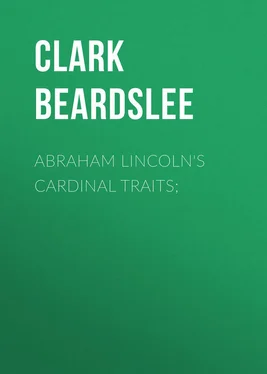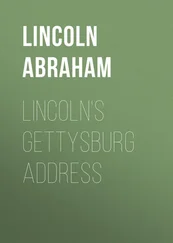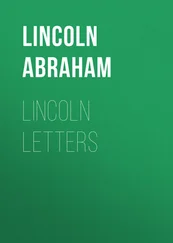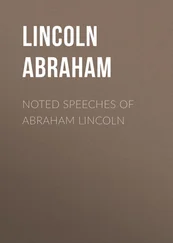Clark Beardslee - Abraham Lincoln's Cardinal Traits;
Здесь есть возможность читать онлайн «Clark Beardslee - Abraham Lincoln's Cardinal Traits;» — ознакомительный отрывок электронной книги совершенно бесплатно, а после прочтения отрывка купить полную версию. В некоторых случаях можно слушать аудио, скачать через торрент в формате fb2 и присутствует краткое содержание. Издательство: Иностранный паблик, Жанр: foreign_antique, foreign_prose, на английском языке. Описание произведения, (предисловие) а так же отзывы посетителей доступны на портале библиотеки ЛибКат.
- Название:Abraham Lincoln's Cardinal Traits;
- Автор:
- Издательство:Иностранный паблик
- Жанр:
- Год:неизвестен
- ISBN:нет данных
- Рейтинг книги:3 / 5. Голосов: 1
-
Избранное:Добавить в избранное
- Отзывы:
-
Ваша оценка:
- 60
- 1
- 2
- 3
- 4
- 5
Abraham Lincoln's Cardinal Traits;: краткое содержание, описание и аннотация
Предлагаем к чтению аннотацию, описание, краткое содержание или предисловие (зависит от того, что написал сам автор книги «Abraham Lincoln's Cardinal Traits;»). Если вы не нашли необходимую информацию о книге — напишите в комментариях, мы постараемся отыскать её.
Abraham Lincoln's Cardinal Traits; — читать онлайн ознакомительный отрывок
Ниже представлен текст книги, разбитый по страницам. Система сохранения места последней прочитанной страницы, позволяет с удобством читать онлайн бесплатно книгу «Abraham Lincoln's Cardinal Traits;», без необходимости каждый раз заново искать на чём Вы остановились. Поставьте закладку, и сможете в любой момент перейти на страницу, на которой закончили чтение.
Интервал:
Закладка:
And his free choice was resolute. His will was without wavering. The side he made his own was forced to face the musketry and forts, the arsenals and fleets, of a would-be nation of angry, determined men – men who would rather die than yield. The choice he made involved the shedding of human blood. This he sadly knew. In four endless years he had been compelled to defend his resolution with arms. And now as he volunteered his oath a second time, his free decision involved again the frightful corollary of war. This meant that within his voluntary oath was a conscious determination, too vigorous and resolute for any threat to daunt, for any form of terror to reverse. His choice was no feeble leaning to one side. Into its formation and into its fulfillment poured all the energy of his life. It was vastly, radically more than impulse, or propensity, or easy, unconsidered inclination. It was a freeman's choice, poised and edged and energized by a freeman's will. It had firmness like the firmness of the hills.
This choice of Lincoln was ponderous. His exercise of freedom, as shown in this inaugural, was dealing, not with things indifferent, not with trifles void of moral moment, nor with empty, immaterial suppositions. When Lincoln shaped and welcomed to himself this preference, he was handling nothing less than the affronts of human arrogance, the greed of human avarice, the cruelty of human slavery, and a confederate's disloyalty. That preference was his free election to enthrone within himself, and within all other men, the stability of a firm allegiance, the grace of human friendliness, the worthy valuation of human souls, and the surpassing beauty of a true humility. It was between such values that his election took its shape. His decision dealt with things primary, enduring, and universal. It was concerned with the elemental affections and convictions of men, while all the time supremely respecting the decrees and judgments of Almighty God. Upon such a level, and amid such values, did the will of Lincoln trace out its path. It was a Godlike energy, sovereign, soberminded, original, free.
But though this freedom of Lincoln, as it reigns through this inaugural, was individually his own, and wrought out into precise experience in personal singleness and independency, by no manner of means was he standing in this scene in moral isolation. He was beset about and wrought upon from many sides by mighty moral energies. For one thing, a vast Republic held him fast in the bonds of loyal citizenship. It was a Republic composed of freemen, to be sure. But those freemen were by no means a miscellany of mutually indifferent and disconnected units. They had formed a Union. That Union had a definite and inviolable integrity. That corporate integrity laid an unrenounceable obligation upon all its membership. It was the sacred respect for the sacred honor of that political bond that proved a man a patriot. To assert the freeman's right to cast aside those bonds proved a man a traitor, and gendered unto bondage. Here unfolds a veritable mesh of moral obligations – obligations of compelling potency. It was precisely in defence and demonstration of those enveloping claims that Lincoln advocated and prosecuted a defensive but relentless war.
The South resented all such claims. They were resolute that national bonds should be defied, that their authority should be annulled. And this they urged explicitly in the very name of freedom. This defiant protest Lincoln's opposite preference had to face. This involved his mind in the study of a problem that is never out of date – a study that will test any student's moral honesty to the quick. Lincoln's championship of moral liberty had to grapple, in the counter championship of Southern arms, a type and sort of freedom that he forever disowned for himself, and that he could never consent to in any other man. This drove him into the study of the nature of a human soul and the nature of social bonds. This inquiry uncovered two foundation rocks, laid deep by our forefathers beneath the fabric of our republic, supports to human honor and stability which no man nor any confederation of men can undermine and overthrow without turning upside down the fundamental supports of harmony and honor among civilians that are free. These two foundation rocks are the divine design that all men should be equal and free; and the certain corollary that governments among men derive their just powers from the consent of the governed. The equality of freemen when they stand apart, and their free consent, when they join in a political league – these are the immovable pillars of character and order among intelligent men. Upon such foundations this government has been placed. That sure basis the South assailed. In the name of freedom that assault must be repulsed. The national environment, the national integrity, the national honor, the existence of the Nation, conceived as it was in liberty, made all such liberty as the South preferred, not a freeman's right, but a sorry simulation, a moral wrong. Government of the people, by the people, was freedom to the core, the core of civic righteousness. In such a government popular and everlasting allegiance was elemental uprightness. Among freemen, the cornerstone of civics is a plighted troth to liberty.
Thus Lincoln argued. And with him to argue thus was to obey. As thus conceived, obedience to his civic pledge went hand in hand with liberty. Enlistment under a government and laws framed by fellow-freemen was to him no limitation of his personal rights. Instead it involved and assured for every bondman a full emancipation, and for every freeman full title forever to every unalienable right. Such a view was indeed ideal, as Lincoln soberly knew; but for that ideal every power of his kingly manhood was ready to struggle and suffer and serve. To bind his hand to such a league was his free choice. To live in loyalty to such a bond was a living pride and joy. Such an agreement was to the end of his days unresented and unconstrained.
But it cost him dearly. No indentured bonds-man ever wrought out sorer toil. None ever suffered through longer, heavier, sadder days. It wore away his life. The war was to his tender soul, as he termed it, "a dreadful scourge." But as he interpreted its trend, its certain winnings outvalued and outweighed its woe. It was freely and willingly, not by any irksome and alien coercion, that he opened his soul to all its sorrows, and poured out all his strength to direct and hasten its consummation. He saw unerringly that it had to do with government by free consent, with the tenure of a freeman's oath, with the validity of a freeman's right. And by a preference that in his freeman's breast was irrepressible, he selected with an open, far-ranging eye to take his place in that terrific conflict in the very brunt, that the Nation and all the world and coming ages might see and enjoy its happy issue in a Union built and compacted indissolubly upon the inviolable oaths and rights of men who are free.
This was Lincoln's law of liberty. It secures to men their freedom; but it binds those freemen in a league. Their civic life is not a solitude. It is a covenant.
But when freemen form a league, their solemn oath, as this inaugural shows, embodies awful sanctions. From such a league and covenant, seven confederate parts were affirming and defending their right to secede, and that by force of arms. This forced freedom to a final definition, and a final test. What follows when a Republic fails? What form of civic order lies beyond, when a league of freemen is violently dissolved? Where will freedom find sure footing, when the fundamental laws of freemen are defied? On this stern question Lincoln fixed his eye. And as his vision cleared and deepened, he grew to see that if freedom among men could ever survive, a freeman's mutual covenant must be inviolate. A freeman's compact must be kept, else on all the earth freedom could find no resting place. If this should ever be denied, that denial must be sternly smitten to the ground. Thus for the very cause of freedom, and as a freeman, Lincoln was driven into war. He was put where he had no other choice. He was forced to fight.
Читать дальшеИнтервал:
Закладка:
Похожие книги на «Abraham Lincoln's Cardinal Traits;»
Представляем Вашему вниманию похожие книги на «Abraham Lincoln's Cardinal Traits;» списком для выбора. Мы отобрали схожую по названию и смыслу литературу в надежде предоставить читателям больше вариантов отыскать новые, интересные, ещё непрочитанные произведения.
Обсуждение, отзывы о книге «Abraham Lincoln's Cardinal Traits;» и просто собственные мнения читателей. Оставьте ваши комментарии, напишите, что Вы думаете о произведении, его смысле или главных героях. Укажите что конкретно понравилось, а что нет, и почему Вы так считаете.












